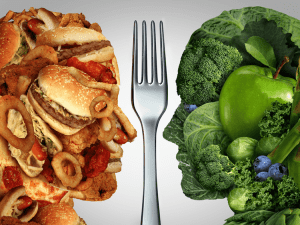I included this image to show the contrast between a meat bases diet and a vegan diet. As you can see they are portrayed as comparable, however the vegetable alternative comes off as much cleaner and natural.
One example of a gendered food is a hungry man TV dinner. Hungry man dinners are frozen meals that you pop in the oven/microwave and suddenly you have a hot, semi-fresh meal usually consisting of a generous portion of meat. Hungry man TV dinners are clearly gendered as they have the name “man” right in the title. One could also attribute the fact that they are basically already cooked and arraigned and all the consumer must do is throw it in the oven to it being a male oriented product. This helps further the narrative of men being above the idea of having to labor in the kitchen. Another construct that is the idea that burping is not lady like. While its rude in American culture for anybody to burp, I feel as though that falls under a pre-conceived notion of being un-lady like.
When discussing human’s relationship with animals, Gaard first covers the nature of oppression. Oppression comes in many forms according to Marion Young as Gaard explains, and can be seen through exploitation, marginalization, powerlessness, cultural imperialism, and violence. Through factors we see how in meat production animals are exploited and looked at as a product rather than a sentient being. The conditions in which these animals live as well as those confined in cages for any reasons sees them marginalized and powerless, as their own well-being is being disregarded, and they are entirely at the whim of their owners. This leads to cultural imperialism, as their own way of life is being entirely diminished and substituted with filling whatever roles their owner has for them. This unfortunately also leads to violence, whether in the form of abuse or of actual slaughter in the case of livestock. Gaard argues that women’s identity of self comes from their relationships with others, whereas males is formed separate and is rights based instead of ethics based. I think Gaard’s explanation has made the most sense to me so far when comparing the oppression of woman to the oppression of other aspects of society, specifically environmental. In drawing that connection, Gaard explains as to why she is compassionate to Bella. Both the suffering of Bella and of the rest of the oppressed world comes from the actions of those who have a rights-based ethic. In the case of Bella, her owners wanted Bella to perform a very specific role by sitting by the counter and talking to customers, without ever thinking about the consequences of that on the bird. As a woman, Gaard sees the connections and her assessment of the bird does not stop at just viewing the bird as a piece of property that one has the right to. She instead understands the implications of the actions on the subordinate. Gaard reflects on what to do and concludes that Bella would be better off being better taken care of in a larger cage with more amenities and companions, although being completely cage free would be difficult. “Responding to Bella’s suffering means accepting a responsibility for my own complicity in a system of inter-species domination, and acting on my commitment to serve as an ally” (Gaard). Gaard visit Bella often and tries to bring her goodies to cheer her up. Importantly, she recognizes Bella’s oppression and tries to defend and advocate for her.
Curtin describes herself as a contextual moral vegetarian. By asserting herself as such, she admits that there are times when eating meat is pretty much necessary for one’s survival. In cases like this, it is acceptable to kill put your own interests ahead of the animal that you would eat. But there is a stark difference to situations like that and the scenario in a country such as America, where we generally have an abundance of food choices available that do not require any slaughtering.
For those living in an environment in which they have options and can ultimately decide whether to eat animals, Curtin offers up some insight into the attitude that is consistent with the themes of eco feminism. Curtin makes the case that choosing to not eat meats avoids needless suffering for the animal, and that it is our part to enact change that we would like to see permeate other areas of society. “It should not be understood as an injunction that include the imperative to rethink what it means to be a person connected with the imperative to rethink the status of nonhuman animals.” (Curtin) What I found interesting however is that she doesn’t go as far to say that in that decision we should place ourselves as equal to the animals. Instead she implies that we can try to transcend the unneeded oppression that we see around us by starting to make decisions ourselves that eliminate oppressive tactics.
Gaard makes note of the idea of human and non-human animals being equal mentions in her article. “Admittedly, the feminine caring ethic feminists criticize does not include the caregiver as an equal to those she cares about. Equally important from an ecofeminist perspective, is the fact that the relational self-theory as originally constructed is entirely anthropocentric; it fails to account for trans-species relationships with non-human animals, with plants and place, relationships the also shape self-identity” (Gaard). Gaard started off in saying that even though it is her relational self that gives her compassion to Bella, that very form of identity leads to subordination among females. However, even with their caring disposition, the feminist perspective is still rooted on the idea that humans are superior to other species. Curtin acknowledges this as well, however she comes to the conclusion that they should continue to not look at each other as necessarily equal, but should animals none-the less be treated with dignity as much for the sake of the human in making sure that they do not perpetuate any unnecessary violence at all.
To bring in an outside source I decided to look up how important our relationship with meat is. As it turns out, except for b12 humans can find pretty much everything else they need naturally growing on the Earth. “Neal Barnard of the Physicians Committee for Responsible Medicine even notes that when people switch from meat-eating to plant-eating, their intake of vitamins and other nutrients improves” (King). While of course as Curtin pointed out, some people don’t have much options when it comes to what they eat when they decide on animals, but fortunately many people do not take the animal for granted by expressing gratitude and respect. But we in America tend to glorify meat consumption. In her article, Barbara King often mentions Marta Zarask and her book Meathooked: The History and Science of Our 2.5 Million-Year Obsession with Meat. “Zaraska wrote Meathooked primarily to discover why humans across the world crave meat” “Factors of biology including certain genetic predispositions and culture, ranging from family habits and cultural traditions to the sexual politics of meat as explained by Carol J. Adams, all play a role, she says.” (King). I find it interesting that they mention a genetic predisposition towards meat, because I feel like that implies that meat is an essential part of their diet, although at else some of that may be substituted with b12 supplements and vitamins. As I meat-eater I certainly understand the desire for meat, especially if it is essential to diet, however it’s clear we live In a society that pushes us in the direction to consume more meat than we have to/
https://www.npr.org/sections/13.7/2016/05/19/478645426/humans-are-meathooked-but-not-designed-for-meat-eating
https://cdn.shortpixel.ai/client/q_glossy,ret_img,w_800/https://whoopwellness.com/wp-content/uploads/2018/08/vegan-brain-vs-meat-eater-brain.png


